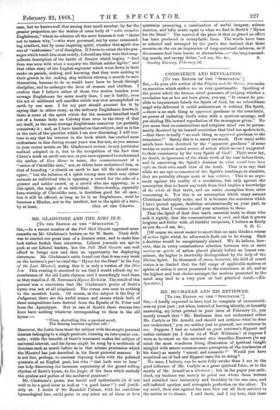MR. GLADSTONE AND THE DIES IRiE.
[To THE EDITOR OF THE "SPECTATOR."] SIR,—In a recent number of the Pall Mall Gazette appeared some remarks on Mr. Gladstone's lecture on Sir W. Scott. Their drift was to convict our great man of a literary error, and to make him look rather foolish than otherwise. Liberal journals are apt to peck at our Liberal leaders, but the Pall Mall Gazette can well afford to forego now and then an opportunity for displaying cleverness. Mr. Gladstone's critic found out that it was very weak on the lecturer's part to extol the " Hymn for the Dead " in the Lay of the Last Minstrel, seeing that it is only a version of the Dies Irss. This evening it occurred to me that I would refresh my re- membrance of the old Latin rhymes, and I accordingly read them as they stand in J. H. Newman's Ilymni Ecclesias. The result of this perusal was a conviction that Mr: Gladstone's praise of Scott's hymn was not at all misplaced. The verses owe next to nothing to the monkish Latin. Of course, as the subject is the Day of Judgment, there are the awful scenes and events which both of these compositions have derived from the Epistle of St. Peter and from the Apocalypse. But in one of Scott's three stanzas two lines have nothing whatever corresponding to them in the old hymn :—
" When, shrivelling like a parched scroll, The flaming heavens together roll."
Moreover, the Latin lines treat the subject with the simple personal interest belonging to a single penitent, running on into quaint con- ceits; while the breadth of Scott's treatment makes the subject of universal interest, and his hymn might be sung by a multitude of devotees such as march before us in that solemn procession which the Minstrel has just described in his finest pictorial manner. It is not fair, perhaps, to contrast rhyming Latin with the polished quatrain of an English poet, but who " that hath ears to hear" can help discerning the immense superiority of the grand rolling rhythm of Scott's hymn, to the jingle of the lines which embody the qualms and pathos of the mediaeval penitent?
Mr. Gladstone's praise was fervid and enthusiastic (is it not well to be a good lover as well as " a good hater ?") and justifi- ably so. I doubt if Sir Roundell Palmer, with his matchless hymnological lore, could point to any other set of three or four quatrains presenting a combination of awful imagery, solemn emotion, and lofty music equal to what we find in Scott's "Hymn for the Dead." The marvel of the piece is that so grand an effect has been produced in octosyllabic lines. The words have been so selected and arranged by the poet's fine instinct that there remains on the ear an impression of long-sustained cadences, as if the measure had been heroic or alexandrine,—" the long resound-
ing march, and energy divine."—I am, Sir, &c., S. Sunday Evening, February 16.


































 Previous page
Previous page